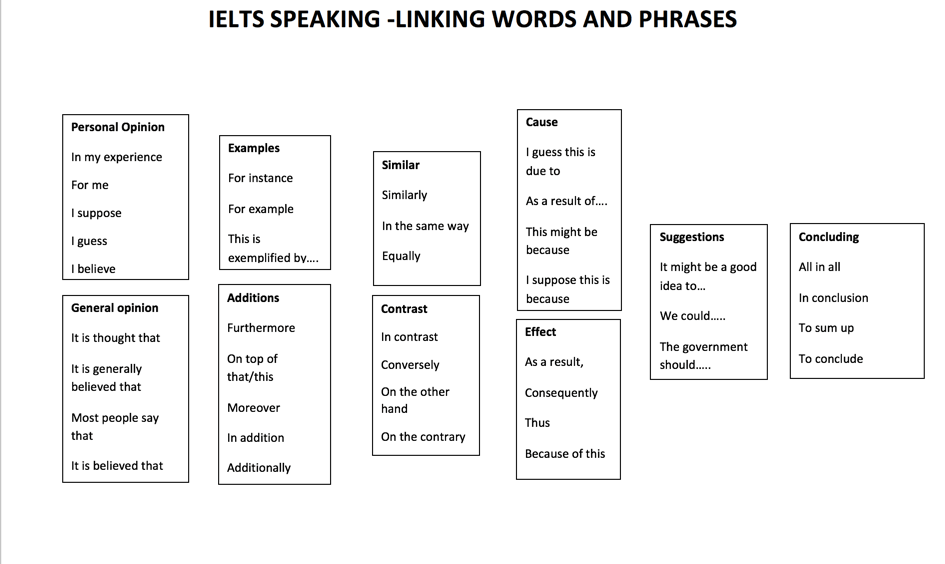Get in touch
555-555-5555
mymail@mailservice.com

IELTS SPEAKING BAND DESCRIPTORS: EVERYTHING YOU NEED TO KNOW
As you may know, in IELTS you given are a score between 1 and 9. A score of 9 is the highest possible. You will get a band score for each section of the exam (listening, reading,
writing, speaking). In this article, I will explain the IELTS speaking assessment criteria, or what the examiner needs to hear to give you a high score in the speaking section and give you some tips on how you can improve your score.
THE 4 BAND DESCRIPTORS FOR IELTS SPEAKING
In the speaking section of the exam, the examiner will give a score in 4 areas;
- Grammar
- Lexical resource(vocabulary),
- Fluency
- Pronunciation.
1. GRAMMAR
Put simply, the examiner will think about two things when assessing your grammar:
1. Is your grammar accurate?
2. Do you use a range of (different types of) grammar?
TIPS FOR IMPROVING YOUR SCORE IN GRAMMAR
1. Avoid errors!
If you make many simple grammatical errors in your IELTS speaking exam, you will not get a high score. Common errors here include:
- Using prepositions(in,at,on) incorrectly,
- Using present simple when you should use past simple.
A good way to improve your grammatical accuracy is to record your answers to questions on your phone. Then listen back to your speaking and take note of any grammatical errors you made. Then answer the question again, this time using your notes to avoid errors. Grammatical errors are often due to bad habits rather than a lack of knowledge. By hearing and correcting your own mistakes, you will remember much more quickly than if a tutor or teacher corrects you.
2. Use different tenses
It is your job to show the examiner your knowledge of grammar in the IELTS speaking exam. You should try to include as many tenses as you can. Even if the question asked is in the present tense, you should try to expand and use other tenses. It is usually easy to give past tense examples in part 1 speaking. You should also show the examiner your knowledge of more complex tenses such as conditional tenses, perfect tenses(present perfect/past perfect) and
continuous tenses. If you're not familiar with the tenses I have mentioned, you need to get studying!
3. Use different sentence structures
Similar to tip number 2, only using simple structures and short sentences will not get you a lot of marks for grammar. You need to show the examiner your knowledge by using some more complex sentences and structures. You should try to make your sentences more descriptive by using relative clauses(who, when, which, whose, that, when). Using a passive voice is another great way to show the examiner your knowledge of grammar.
2. LEXICAL RESOURCE (VOCABULARY)
Similar to grammar, the examiner will think about two things when assessing your vocabulary:
1. Is your vocabulary accurate/suitable?
2. Do you use a range of vocabulary?
TIPS FOR IMPROVING YOUR SCORE IN LEXICAL RESOURCE
1. Don't repeat the same simple words
Many students get a low score for vocabulary, not because they do not know a lot of vocabulary but because they repeat the same words over and over again. It is therefore essential to use synonyms. I have made a video dedicated to this which you can check out here.
2. Paraphrase the questions
Lower level students tend to repeat the words in the questions back to the examiner. This will lose you marks for vocabulary. Instead, you should try to paraphrase the question(use synonyms). Of course this will not always be possible but you should do it when you can. You can learn more about this by looking at our sample answers here.
3. Use some less-common vocabulary
IELTS covers a broad range of topics and it essential that you have vocabulary to talk about a range of topics. It is a good idea to spend some time making vocabulary lists for common topics. You do not need to know hundreds of words for each topic but knowing and using a few keywords related to each topic will help to increase your score. There is no shortcut here and it will take some time to expand your vocabulary.
You should use a notebook to write down some keywords. Higher level students(you!) should aim to learn 6-10 new words per day. Below are some great sources for learning less common words for IELTS speaking.
-Youtube
-News article
-IELTS textbooks
4. Use some idioms
Idioms are a great way to show the examiner your range of vocabulary. Additionally, idioms can be used for many topics. However, many students make mistakes by using the wrong idioms or overusing idioms which is not natural. I have made a full video dedicated to using idioms which you can find here.
3. FLUENCY & COHERENCE
The examiner will think about two things when assessing your fluency and coherence:
1. Are your answers long enough?
2. Do you speak smoothly and naturally?
3. Are your answers organised and easy to understand?
4. Do you use linking words?
TIPS FOR IMPROVING YOUR SCORE IN FLUENCY & COHERENCE
1. Record your speaking, correct and repeat!
If you do not have a teacher or friend to practice speaking with, a great way to improve your fluency is to record your speaking on your phone, tablet or laptop. To improve your score for fluency you should do the following:
1. Choose a part 2 speaking question. (Part 2 is a test of fluency and usually the part students lose marks for fluency)
2. Prepare for 1 minute.
3. Record your answer. Try to speak for at least 90 seconds.
4. Listen to the recording and take notes of your mistakes.
5. Repeat until your answer is smoother and has fewer errors.
2. Use linking words
Using linking words or cohesive devices are essential to getting a high score for fluency and coherence. Linking words help to make your answer organised and understandable. This is particularly true for part 3 because your answers will be longer. See below for a range of linking words that you should use in your speaking exam.
http://3. Use Fluency Markers
Fluency markers are phrases and such as 'I guess' and 'to be honest' which help to communicate our ideas more effectively and clearly. You can learn more about fluency markers here.
The examiner will think about the following things when assessing your pronunciation:
1. Is your pronunciation understandable?
2. Do you pronounce words and sounds accurately?
3. Do you use intonation?
Many students think that they need to have a UK or North American accent to get a high score for pronunciation. This is not true. You are marked on how clear your pronunciation is.
TIPS FOR IMPROVING YOUR SCORE IN PRONUNCIATION
1. Listen, listen, listen and repeat!
Similar to learning vocabulary, there really is no shortcut to improving your pronunciation. Many teachers and books recommend focusing on individual sounds or using the phonetic alphabet to improve pronunciation. However, in my experience, the students that have the best pronunciation are those that spend a lot of time listening to English. You should make it a daily habit to watch a video or listen to a podcast in English. It is also a good idea to pause and repeat phrases that you hear. As mentioned, improving your pronunciation will take some time so I recommend that you choose videos or podcasts about things that you are interested in. If you like fashion, google 'Fashion podcast' or search youtube for videos related to fashion. Most students do this everyday for a week and then quit. I will warn you now; you will not see improvements in a week. You need to make this part of your daily schedule!
2. Speak with a native speaker
Speaking with a native speaker is one of the most effective ways of improving your pronunciation because you can listen to their pronunciation and the native speaker can help to correct you on any words you may be mispronouncing. If you have any friends that are native English speakers, you should ask them to help you. If you can afford it, it is a good idea to hire a tutor online.
I hope you found this article useful! You can get access to the official band descriptors here.
If you are aiming for a band score of 7 or higher, you may in joining our IELTS SPEAKING MASTERCLASS.
Leave a comment below if you have any questions or something you need me to explain in more detail!
Mal
Want to get 6.5 or above?
Join our IELTS SPEAKING MASTERCLASS COURSE!
LEARN MORE
© ESSENTIAL IELTS 2020 | ALL RIGHTS RESERVED | TERMS AND CONDITIONS
IELTS SPEAKING ESSENTIALS
IELTS SPEAKING PART 1 - TIPS AND SAMPLE ANSWERS
IELTS SPEAKING PART 2 - TIPS AND SAMPLE ANSWERS
IELTS SPEAKING PART 3 - TIPS AND SAMPLE ANSWERS












